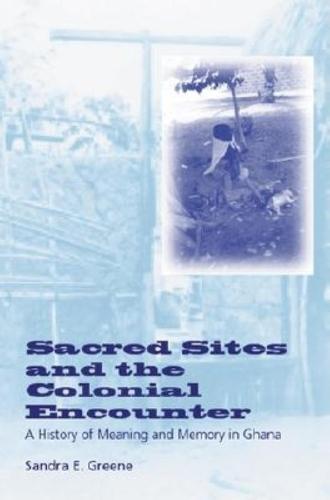Awards
- Winner of Finalist, 2003 Herskovits Award.
Overview
To what extent did colonialism affect the terms by which the colonised understood the material and spiritual landscapes in which they lived? What history, memories, and meanings survive from the colonial encounter and before? In Sacred Sites and the Colonial Encounter, Sandra E. Greene explores the material and spiritual meanings that the Anlo-Ewe people of Ghana once associated with particular bodies of water, burial sites, sacred towns, and the human body itself and brings these meanings and memories into contemporary context for the Anlo. As a key to understanding the Anlo world view, Greene reconstructs a vivid and convincing portrait of the human and physical environment of 19th century Anlo. Drawing on her extensive fieldwork, early European accounts, and the archives and publications of the Bremen Missionary Society, Greene charts how these ideas changed following contact with British colonisers and German Pietist missionaries who discouraged spiritual interpretation of these sites in favour of more scientific and regulatory views. Anlo responses to these colonialist challenges to their ways of organising physical space involved considerable resistance and, over time, selective acceptance of aspects of new beliefs. The result was that the Anlo began to attribute as never before, more varied and sometimes contradictory meanings to the body and the spaces they inhabited. According to Greene, this selective acceptance explains why certain sites have retained earlier meanings while others have lost their former spiritual significance and are no longer remembered as sacred. The fate of particular meanings and memories have determined the ways in which the Anlo, as individuals and as a community, have reconfigured their identities in the face of their colonial experiences. Where new meanings have proved more convincing or more useful, older meanings have been relegated to the realm of nostalgia. Where new values and ideas have failed to offer effective ways to cope with daily concerns, the Anlo resort to the old ways to give relevance to their world. Despite the multiple meanings about place, space, and the body, Greene shows how the Anlo have been largely successful in forging a collective consensus about how to manage their environment and demonstrates that this ability to regulate and define their physical landscapes forms a strong basis for community identity.
Full Product Details
Author: Sandra E. Greene
Publisher: Indiana University Press
Imprint: Indiana University Press
Dimensions:
Width: 15.50cm
, Height: 1.70cm
, Length: 23.50cm
Weight: 0.476kg
ISBN: 9780253215178
ISBN 10: 025321517
Pages: 224
Publication Date: 14 May 2002
Audience:
Professional and scholarly
,
Professional & Vocational
Format: Paperback
Publisher's Status: Active
Availability: In Print

This item will be ordered in for you from one of our suppliers. Upon receipt, we will promptly dispatch it out to you. For in store availability, please contact us.
Reviews
This is a fascinating work that analyzes the colonial encounter through a nuanced examination of the realm of cognition and belief. --Emmanuel Akyeampong Greene's work is an original, wide-ranging, and engaging scholarly contribution to the literature on colonialism and religious change in sub-Saharan Africa... Greene sheds light on the process of cultural interaction in a way which does not diminish African capacity and resiliency while acknowledging the power of Europeans to shape local discourse. --John H. Hanson This is a fascinating work that analyzes the colonial encounter through a nuanced examination of the realm of cognition and belief... Greene gives the reader a vivid sense of the Anlo encounter with western thought and Christian beliefs ... and the resulting erasures, transferences, adaptations, and alterations in their perceptions of place, space, and the body. Emmanuel Akyeampong Greene's work is an original, wide-ranging, and engaging scholarly contribution to the literature on colonialism and religious change in sub-Saharan Africa... Greene sheds light on the process of cultural interaction in a way which does not diminish African capacity and resiliency while acknowledging the power of Europeans to shape local discourse. John H. Hanson ... a remarkable piece of work. --James Gibbs, Univesity of the West of England in the LEEDS AFRICAN STUDIES BULLETIN, No. 65, 2003
""This is a fascinating work that analyzes the colonial encounter through a nuanced examination of the realm of cognition and belief."" --Emmanuel Akyeampong ""Greene's work is an original, wide-ranging, and engaging scholarly contribution to the literature on colonialism and religious change in sub-Saharan Africa... Greene sheds light on the process of cultural interaction in a way which does not diminish African capacity and resiliency while acknowledging the power of Europeans to shape local discourse."" --John H. Hanson ""This is a fascinating work that analyzes the colonial encounter through a nuanced examination of the realm of cognition and belief... Greene gives the reader a vivid sense of the Anlo encounter with western thought and Christian beliefs ... and the resulting erasures, transferences, adaptations, and alterations in their perceptions of place, space, and the body."" Emmanuel Akyeampong ""Greene's work is an original, wide-ranging, and engaging scholarly contribution to the literature on colonialism and religious change in sub-Saharan Africa... Greene sheds light on the process of cultural interaction in a way which does not diminish African capacity and resiliency while acknowledging the power of Europeans to shape local discourse."" John H. Hanson "" ... a remarkable piece of work.""--James Gibbs, Univesity of the West of England in the LEEDS AFRICAN STUDIES BULLETIN, No. 65, 2003
Author Information
Sandra E. Greene is Associate Professor of African History at Cornell University. She is author of Gender, Ethnicity, and Social Change on the Upper Slave Coast: A History of the Anlo-Ewe and is working on a book on religion in the Atlantic slave trade. She is past-president of the African Studies Association.




